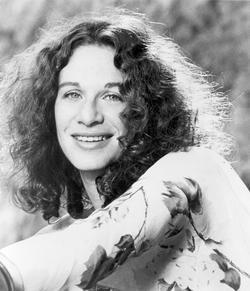Singer-Songwriters
A nice Jewish girl from New York and a Soviet emigree, singer-songwriters Carole King and Regina Spektor have both shaped the sound of their generations. King created pop-folk melodies and soulful lyrics that topped the charts in the 1970s and have remained in the popular canon ever since. Spektor has created her own musical niche, combining different styles, languages, and instrumentation into a fully original sound. Both are virtuosic pianists, whose bold playing is as central to their music as their lyrics or voices.
From her mid-century upbringing as Carol Klein, a second-generation Jewish-American girl from Brooklyn, Carole King became one of the defining voices of her generation. She wrote her first pop songs at age 17, then formed a writing team with her first husband, Gerry Goffin, composing commercial hits for other singers. After divorcing Goffin, she began performing her own songs, distinguished by her husky alto and lyrics that voiced the yearnings of a liberated woman.
King’s career and her reputation as a musical icon were cemented with the release of her album Tapestry in 1971. With such songs as “I Feel the Earth Move,” “It’s Too Late,” and “So Far Away,” the album became the soundtrack of an era. It topped the charts and continues to be considered one of the most influential albums of all time. One after the other, the songs on Tapestry feature unforgettable melodies and lyrics that celebrate love, friendship, and women’s inner beauty.
As a woman coming into her own in the 1960s and ‘70s, King was a new kind of pop star: she pursued partnerships with men who were her professional equals, and projected an easy, confident sexuality. She never tried to cover up her New York accent or her ethnic looks; to her, the female ideal is not to be conventionally beautiful but to be natural. As she sings: “You’re going to find that you’re as beautiful as you feel.”
Carole King has enjoyed a renaissance in the last decade, with the release of the remastered edition of Tapestry in 2008; the 2012 publication of A Natural Woman: A Memoir; and a Broadway musical about her life and career, Beautiful. In December 2015, she was honored at the Kennedy Center for her lifetime contribution to American culture. Her influence on music, and on other musicians, was on full display when Aretha Franklin belted out “(You Make Me Feel Like) A Natural Woman,” a Carole King composition Franklin had covered and made famous. It was a show-stopping performance, and King was visibly moved. As an anthem to uncovering one’s “natural” self, the song was the perfect choice to honor a musical figure who has maintained her own brand of feminism and personal integrity throughout decades of fame.
Like Carole King, Regina Ilyinichna Spektor has won acclaim and an ardent following by insisting on doing things her way. Spektor was also a musical prodigy, showing talent early when she began playing piano at age six. When her family emigrated from Russia to escape religious persecution and settled in the Bronx, they had to leave their piano behind. Nine-year-old Regina soon talked her way into getting free lessons and access to a neighborhood piano.
Despite (or because of) her classical training, Spektor has made a career and developed a rapt following out of defying musical categorization. Early in her career, she began to experiment with jazz, punk, hip hop, rock, folk, and klezmer—an unusual combination of styles for any musician, but particularly for a pianist. She also began using her voice experimentally, often layering unusual vocal punctuation and percussion into her songs. In one of the most evocative descriptions of Spektor’s music, The Guardian called her a musical matryoshka doll (or Russian nesting doll)—for the interconnected levels of sound she creates.
Spektor deliberately tries to make each of her songs unique and not to build an oeuvre defined by a distinctive style. She also admits to a quirky creative spirit; while she would love to create classic songs with widespread appeal, she says, “weird songs about meatballs in refrigerators come into my head [instead]—I can't help it.” Spektor’s lyrics range from the philosophical to the absurd, and are populated by colorful characters and surprising literary allusions.
While retaining the indie-folk fan base she developed in her earliest days as a performer in New York’s East Village, Spektor has also had mainstream success. Her song “You’ve Got Time” is the theme of the hit show Orange is the New Black, and several Spektor songs have been included in film and television soundtracks. In 2010, she performed at the White House for a Jewish Heritage Month celebration, and received a standing ovation from Michelle Obama. Regina Spektor is on the musical map—and it’s a map of her own drawing.




